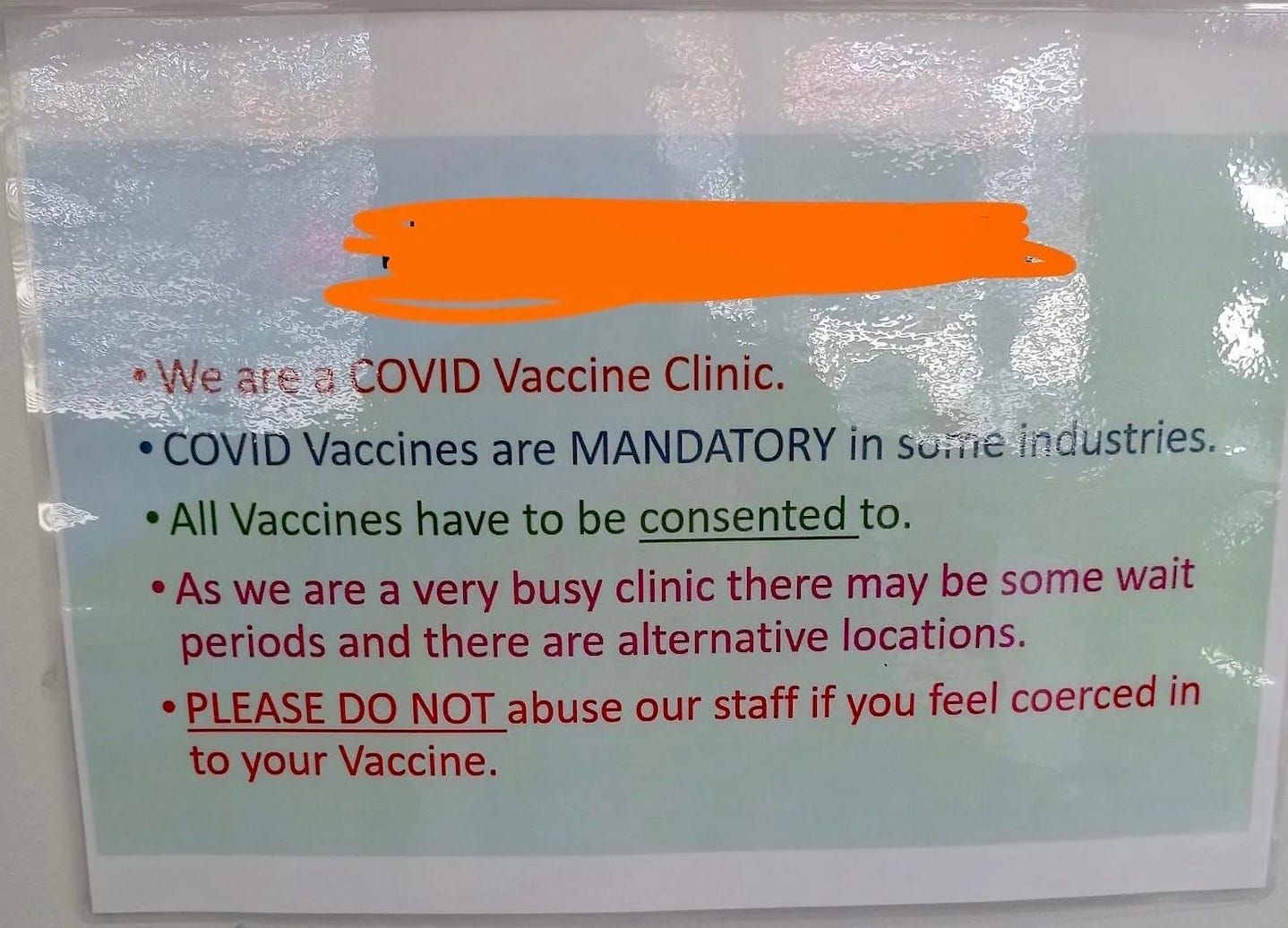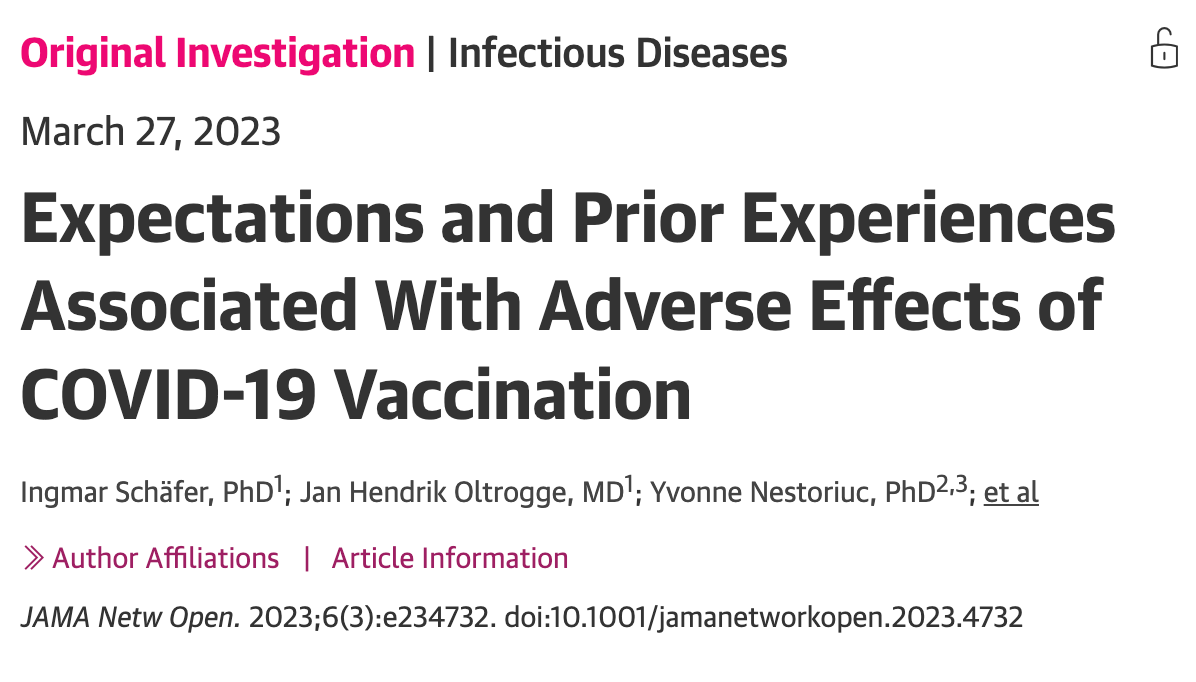Study finds negative attitudes amplify vaccine side effects, providing a strong utilitarian argument against coercive vaccination policies
A new peer reviewed study published in JAMA has found that negative attitudes towards vaccination can increase the severity of vaccine side effects.
This is a strong utilitarian argument against coercive vaccination policies. There’s nothing like having your human right of informed consent snatched away by a profiteering bio-pharmeceutical complex in cahoots with your authoritarian government to give you a negative attitude towards your vaccination appointment.
People under such circumstances might feel so negative about their coerced vaccinations that doctors might feel the need to put up signs like the below, seen at a Perth GP Clinic in early 2022, when over 75% of our workforce was subject to workplace vaccination mandates. The text reads:
We are a Covid vaccine clinic
Covid vaccines are MANDATORY in some industries
All vaccines have to be consented to
PLEASE DO NOT abuse our staff if you feel coerced into your vaccine
Back to the study, which was a smallish prospective cohort study of 1,678 Germans, titled ‘Expectations and Prior Experiences Associated With Adverse Effects of COVID-19 Vaccination.’ The subjects were evaluated prior and post their second Covid vaccination to determine if psychosocial context factors were associated with their experience of vaccine side effects.
The researchers observed three factors which contribute to the severity of vaccine adverse events:
Negative personal prior experiences from the first Covid vaccination;
Low expectations regarding potential benefits / high expectations regarding potential harms of vaccination; and,
Symptom misattribution, which is also referred to as “the tendency to catastrophize instead of normalize benign bodily sensations.”
This led the researchers to conclude that some vaccine side effects are the result of the ‘nocebo effect’, i.e.: illness caused by expectations and beliefs, rather than the vaccine itself.
There’s truth in this. Placebo and nocebo are documented effects, and the field of mind-body philosophy and medicine supports the idea that the mind can play a role in creating real symptoms in the body.
But, as is so often the case in recent studies touching on vaccine side effects and hesitancy, it’s in the conclusion that the study falls down. Emphasis mine:
“Clinician-patient interactions and public vaccine campaigns may both benefit from these insights by optimizing and contextualizing information provided about COVID-19 vaccines. Unfavorable nocebo-related adverse effects could then be prevented, and overall vaccine acceptance could be improved.”
The authors seem to think that improving delivery of Covid vaccine information will reduce negative attitudes, thereby reducing nocebo-related adverse effects.
I really do not think lack of education is the primary problem here.
The authors seem unaware that Covid vaccines are possibly the most dangerous class of drug in the history of big pharma - more evidence of this was reported today by Maryanne Demasi. It is reasonable to expect that you might be harmed by a drug that is harmful. Pretty propaganda pamphlets and TikTok sizzle reels are unlikely to assuage this negative belief, because it’s true.
Covid vaccines are also astonishingly ineffective. It is understandable, then, that some people will attend their vaccination with low expectations of effectiveness. Will educational resources assuring that the ineffective vaccines are really effective reduce nocebo effects here? Again, unlikely.
In the case of people who have had a negative experience from their first shot, it’s hard to understand why the researchers would think that providing ‘information’ would improve the patient’s outcome for the second shot. If the patient had a bad side effect from the first vaccination, the appropriate medical response is to chalk them up as contraindicated and find an alternative solution. Sending a contraindicated patient back for round two is, as one doctor told me, “unprecedented in medicine” prior to the coercive Covid vaccine rollout.
One group that may benefit from the informational approach is those who are prone to catastrophising instead of normalising benign bodily sensations. Having said that, some people who are hyper vigilant to body sensations have good reason to be. Readers with autoimmune and chronic pain conditions will know what I’m talking about.
A better conclusion to this paper would be:
”Negative attitudes worsen side effects after vaccination. Therefore, public health policy should seek to alleviate negative attitudes by making vaccination a free choice, by ensuring that alternative treatments are readily available, and by treating individual patients as psychologically and biologically unique. Moreover, government, regulatory and health bodies should conduct themselves with complete transparency and accountability, so as to earn the public’s trust, which will in turn stimulate more positive attitudes towards recommended public health strategies.”
But we are still living in the Upside Down, and so I suspect the playbook will go more like this:
Negative attitudes cause vaccine side effects
Misinformation causes negative attitudes
More censorship is required to keep you safe from misinformation/side effects
The vaccine hesitant should be 'reeducated'
And anyway, most reported vaccine side effects are simply misattributed nocebo effects




I wonder if they read their own sign, observing that vaccines are mandatory and have to be consented to? The semantics of this is horrific ... observing that it is mandatory to consent. Huh??
At present, in Australia, there is a spirited debate about the meaning of 'consent' in the context of consent to engage in sexual activity, and children are even being taught about this in schools - quite appropriately of course. The essence of consent is that a person freely acquiesces to something, in a context in which they have a choice to do so or not. When people are not free to choose, it is factually incorrect to suggest that consent is mandatory. What is mandatory in such a context is compliance - which is not the same thing as consent.
Of course, in the case of vaccination, consent is only acceptable when it is *informed* consent, when known risks and benefits are clearly explained, and undetermined risks are at least described (e.g., "We really don't have research yet on the long-term effects of the vaccinations, nor of their effects on your pregnancy/fertility/... as these things have not yet been studied"; but that is another matter. A clear implication of the sign, too, is that it would be improper to engage in an extended discussion with the doctor (or whoever was doing the vaccinating), as this would be seen as rendering the vaccination process less efficient, especially if the discussion did not result in 'consent' being attained. Ironically, however, people in Australia were regularly and publicly advised to discuss the matter with their (busy) doctor, rather than to seek alternative advice.
Orwellian, at least.
Take your coercion and like it!